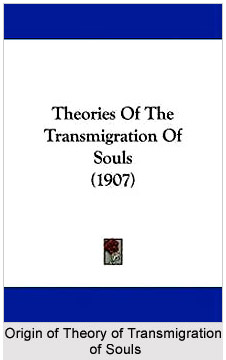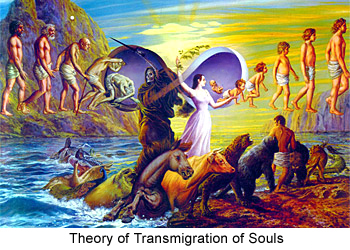 Origin of theory of Transmigration of Souls is said to have been born in India around 650 B.C. From here it is believed to have migrated to other parts of the world. The first reference to transmigration occurs in the Brhadaranyaka Upanishad which is believed to be the oldest and the longest of the Upanishads. It was associated with the sage Yajnavalkya. In the Upanishad there is a passage that reveal about the doctrine of Karma. It has also been advocated that whoever does good is a good soul and whoever indulges in bad deeds is a bad soul. Therefore it can be conceived that this theory was proposed by Yajnavalkya who initially divulged it only to chosen disciples and made it public later.
Origin of theory of Transmigration of Souls is said to have been born in India around 650 B.C. From here it is believed to have migrated to other parts of the world. The first reference to transmigration occurs in the Brhadaranyaka Upanishad which is believed to be the oldest and the longest of the Upanishads. It was associated with the sage Yajnavalkya. In the Upanishad there is a passage that reveal about the doctrine of Karma. It has also been advocated that whoever does good is a good soul and whoever indulges in bad deeds is a bad soul. Therefore it can be conceived that this theory was proposed by Yajnavalkya who initially divulged it only to chosen disciples and made it public later.
Another key text that proves the origin of the doctrine of transmigration is in a later portion of the Brhadaranyaka Upanishad. It is also repeated in the second-oldest of the Upanishads, the Chandogya Upanishad which has been proposed by another famous sage, Uddalaka Aruni.
 The souls of those who understand this mystery as well as revere faith as truth merge in the flame of the pyre. They reach the sun after some complications and then in the flashes of lightning they are led to the world of Brahman. The souls of the moral dead who are unaware of the mystery as well as perform sacrifice, almsgiving and penance, go through similar process and find their way to heaven. This brief statement in the Brhadaranyaka Upanishad is expanded and clarified in the Chandogya Upanishad.
The souls of those who understand this mystery as well as revere faith as truth merge in the flame of the pyre. They reach the sun after some complications and then in the flashes of lightning they are led to the world of Brahman. The souls of the moral dead who are unaware of the mystery as well as perform sacrifice, almsgiving and penance, go through similar process and find their way to heaven. This brief statement in the Brhadaranyaka Upanishad is expanded and clarified in the Chandogya Upanishad.
It has been said that who have pleased the Gods were reborn as one of the three higher castes. Those whose conduct evil and are reborn as an outcaste. This same theory is seen in the beginning of the early Kausitaki Upanishad. Here however there are some differences. The soul need to undergo many tests and ordeals till it reaches the throne of Lord Brahma. Finally the soul is identified with Brahma and is never reborn.
These accounts of the doctrine of transmigration suggest that it began in a secretive manner. It was not widespread among the masses before it was taken up by the higher classes. It can be ascertained that this theory arose out of floating ideas. Transmigration is a fact of life. In other religious text following these Upanishads the passages suggests that this doctrine was taught by the Brahmans and passed down to the lower orders. The ascetics to some extent are responsible for spreading this theory.



















